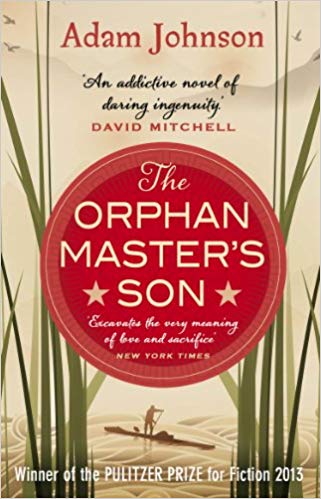The Orphan Master's Son

"But where was the film, that had no beginning, an unrelenting middle and ended over and over?"
"An ending to my story? My story has ended ten times already and yet it never stops. The end keeps coming for me, and yet takes everyone else."
These two paragraphs from this book sum up its review.
What marks a good book for you? When you feel emotionally connected to it, does that count as a good book or is it pure pleasure of reading good prose in spite of the story or story is the king, damn the prose? Or the writing style of the author. Does that matter to you enough for it to warrant itself to be categorised a good book?
The Orphan Masters Son is one such book which satiates everyone's taste but it comes with its own conditions. You want to feel emotional: so the author creates a guy -next- door protagonist. It could have been you, me or anyone walking down the street. But, the streets of North Korea. The author got me there. I couldn't return the book to its shelf once I read the publishers blurb. However, once I started reading, I felt that probably this is going to be the one which will be my first to go on the abandoned shelf. There are mainly two reasons: one is the prose. (so the second factor, appealing to someone, who loves prose, a slow reader maybe) It's too heavy for a fast reader like me. The second reason: I had no clue about North Korea and it's culture (?), Hence I couldn't relate to it at all. However, I gave myself a target of 75 pages to make the decision. But perseverance paid. The story came in the picture. The plot begins to build. (You also resign to the thought that North Korea might just well be another district from The Hunger Games and that's one problem with the book, you can't distinguish between fact and fiction) The story hooks you with its mysterious background and you then can't put it down.
There are two parts to the book and the first part story builds the character of the protagonist, a person who is not a hero but a person who is doing whatever to survive. Though the prose is difficult the writing style is linear.
Come the second and most interesting part where the story picks up the pace and the author uses three different narratives. And I wonder why? Two narratives are understandable but the third which brings a new character in the first person is completely lost to me. As the line from the book says, the middle is unrelenting and that's the beauty of this book. However, patience is required to begin and end this book.
Some say it is a political satire and has to be read in that manner but my feeling is that for a closed country like North Korea a satire blurs the line between fact and fiction and hence should have been used cautiously. The author also uses a lot of metaphors, most of them get lost in the heavy prose.
Overall it's a slow good read and does instigate you to delve more in North Korea. (My husband was shocked to hear that I who does not show interest in most documentaries, finished watching 5 videos on North Korea, after reading this book.)
This book also made me wonder what your dreams and ambitions are made of if you have no knowledge of the world outside. Are the people there happy because they know nothing of any other lifestyle, freedom? Bringing me to the debate of capitalism and socialism where capitalism has created so many wants and desires that we have forgotten to be happy in small things.. well that's too much right now.. maybe a topic for some other time. But I leave you with this another beautiful line from this book.
"He was clearly confusing himself and his story"
Don't we all do?
Buy the book here:
